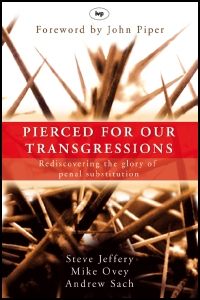UPDATE – I have commented on criticism this post has received in a post entitled “Who is preaching another gospel?“
The history of the Church is quite simply the history of unlikely heroes who God raises up to meet the challenges of the hour. It was a great delight for me to recently spend some time with two such heroes—Dr. Andrew Sach and Dr. Steve Jeffery. They are both Anglican ordinands studying at Oak Hill Theological Seminary and yet, together with their new Principal-Elect, Dr. Mike Ovey, they have written a book that is shaking the evangelical world.
As we sat and ate mushroom soup in a very ordinary flat, I couldn’t help but give thanks to an extraordinary God who uses ordinary people for His purposes.
 Pierced For Our Transgressions is a substantial theological book, yet it outsold its first print-run in just a few days. It has also had the longest list of endorsements of any recent evangelical book. When I spoke with Andrew and Steve, it had not been long since N. T. Wright had issued his strong rejection of their work as “profoundly unbiblical.”
Pierced For Our Transgressions is a substantial theological book, yet it outsold its first print-run in just a few days. It has also had the longest list of endorsements of any recent evangelical book. When I spoke with Andrew and Steve, it had not been long since N. T. Wright had issued his strong rejection of their work as “profoundly unbiblical.”
I asked the two of them how they felt about Wright’s rejection of their work and the acclaim it had received from others. They both exuded the quiet, unconcerned response of those who know they have been commissioned by God. Yes, they had expected opposition, but no, they hadn’t realised it would come from N. T. Wright. As far as the long list of endorsements is concerned, this was to them not so much a reflection on the quality of the book itself as on the absolute importance of the topic to such a broad sweep of evangelical leaders. This is what Andrew said:
“We’ve been teased a bit about the length of the endorsements list! And some people have misunderstood it, thinking that it’s there just as a marketing ploy,
or as evidence that we are very insecure! But those pages and pages of names at the start of Pierced for Our Transgressions are not there primarily because everyone loves the book. They are there because those people believe that penal substitution is of critical importance, and they fear that the Church will lose the Gospel if it is abandoned. The fact that such a range of people is represented—bishops, seminary professors, church leaders, songwriters, charismatic and non-charismatic, Baptist and Presbyterian, British, American, African, Australian—is testimony to the consensus that exists: penal substitution is fundamental …
On another level, the endorsements do help with our insecurities! We’re not Old Testament specialists, and so to have top-rate scholars like T. D. Alexander or Tremper Longman III say “They got that right!” is a huge comfort. The same goes for the likes of Don Carson or Peter O’Brien on the New Testament. We’re humbled and surprised by the calibre of people who have backed us, to be honest, but if that strengthens the credibility of our work, especially in the face of opposition like that we’re getting from N. T. Wright, then we’re thankful.”
Their sense of commissioning by God was so palpable that it was no great surprise to hear from them a very similar story to what I had heard from Liam Goligher about the origins of his book on the atonement.
Andrew’s involvement in the current atonement controversy began at Spring Harvest Word Alive in 2004, when Steve Chalke’s book, The Lost Message of Jesus, first hit the shelves. One of his friends in their chalet read out the now infamous portion which speaks of penal substitution as “cosmic child abuse,” and Andrew realised that some kind of response was needed. A couple of weeks later he teamed up with his tutor, Mike, to write a review of the book for the newspaper Evangelicals Now.
Later that year, the Evangelical Alliance hosted a public debate in response to the furore caused by The Lost Message. During the debate, a friend leaned over to Steve and simply asked, “Where is the book that responds to this?” To Steve this came as a challenge that wouldn’t leave his mind. Whilst there were plenty of books that taught penal substitution—John Stott’s classic, The Cross of Christ, for example—they did not deal with recent objections. Steve felt an unshakable conviction that he should do something—he put it down to “providence.” At this point we had a good laugh about how what he had called providence I might well have called prophecy.
Before long Steve had Andrew and Mike on board and the book was born. A publishing contract with IVP UK was obtained, and the American rights have now been taken up by Crossway (rather than American IVP, who have recently published material opposed to penal substitution). Andrew and Steve spoke glowingly of the joy writers experience when they have a publisher behind their book who really cares about the message and not just the profit margin. They were eager to thank the team at IVP UK that helped them so much.
The style of the book is a little different from many previous theological works. They have revived an old model of doing theology which states your position and then interacts with every possible objection to it. At times it almost reads like blogging. I think a book like this serves us well in the age of the online conversation. Interaction and discussion can only help to bring clarity, and ultimately strengthens us theologically. Whilst the writers cannot possibly anticipate every objection, certainly the major ones are highlighted and addressed.
Andrew and Steve are two charming, gentle men who are, however, clearly passionate about our view of the cross. We spent some time discussing the implications of recent events in the evangelical scene—especially in the UK. We all agreed that a reconfiguration of the evangelical culture seems inevitable. Old alliances have broken, and new ones will be forged. Suddenly the old dividing lines do not seem to be as important as what is quite definitely the most important issue facing evangelicalism today. Andrew said:
“We were worried that things could split along charismatic versus conservative lines. Prominent critics of penal substitution, such as Steve Chalke in the UK and Brian McLaren in the States, have most influence in charismatic circles, whereas Steve, Mike, and I—and Liam Goligher for that matter—would probably be identified as “conservatives.” The fact is, though, that there are many charismatic brothers who stand exactly where we are. Mike Pilavachi of Soul Survivor has identified himself as an ally; Greg Haslam from Westminster Chapel has written a passionate article supporting penal substitution for Christianity magazine; New Frontiers are with
us, and many in New Wine.
In the States they have this thing called “Together for the Gospel” which has brought together Christians from very different places on the charismatic/non-charismatic spectrum, united by their common commitment to the evangelical essentials. I think we’re beginning to see the same thing over here with New Word Alive. It’s very exciting.
But, yes, there are those who have taken the other side, and we must have the courage to part company with them.”
These two gentlemen do not pull any punches when required, as this short extract from the book which interacts with the now infamous section from Steve Chalke shows:
Consider this extract from Steve Chalke and Alan Mann’s book, The Lost Message of Jesus:
John’s Gospel famously declares, ‘God loved the people of this world so much that he gave his only Son’ (John 3:16). How then have we come to believe that at the cross this God of love suddenly decides to vent his anger and wrath on his own Son? The fact is that the cross isn’t a form of cosmic child abuse—a vengeful Father, punishing his Son for an offence he has not even committed. Understandably, both people inside and outside of the Church have found this twisted version of events morally dubious and a huge barrier to faith. Deeper than that, however, is that such a concept stands in total contradiction to the statement ‘God is love.’ If the cross is a personal act of violence perpetrated by God towards humankind but borne by his Son, then it makes a mockery of Jesus’ own teaching to love your enemies and to refuse to repay evil with evil.” (Steve Chalke and Alan Mann, The Lost Message of Jesus (Grand Rapids: Zondervan, 2003), pp. 182-183.
This example has it all. First, penal substitution is criticized, but in vague and unspecified terms; it is said to contradict the Christian teaching about God’s love, but we are not told exactly how; it is said to be ‘morally dubious’, but we are not told why; it is said to contradict the Sermon on the Mount, but there is no careful exegesis to enable us to assess this claim.
Secondly, penal substitution is misrepresented. Whoever said that God’s decision to punish his Son was ‘sudden,’ as if to imply that it was a capricious outburst of rage? Certainly no proponent of penal substitution we have read. Was the penal suffering of the cross not carefully planned, even prophesied in Isaiah 53 many centuries before the event?
Thirdly, there is the ultimate example of guilt by association. Penal substitution is portrayed as ‘a form of cosmic child abuse.’ This sticks in the mind, tugging at the conscience, for there are few crimes more despicable than violence towards an innocent, defenceless child.
The fact is that none of it is true. Nowhere in Chalke and Mann’s book do they even attempt to argue that it is true. The above quotation amounts to a form of verbal bullying, a scare tactic calculated to coerce people into abandoning long-held beliefs out of fear of being associated with something nasty.”
That kind of courage and direct talking is much needed in the Church today. I am very glad that Steve, Andrew, and their Principal-Elect, Mike Ovey, have been raised up by God to make such a spirited and needed defence of the Gospel.
It struck me that despite the fact that the church I attend is just a few miles from Oak Hill, if it had not been for the recent attacks on the atonement, I would probably not have met these too delightful servants of God. Sometimes theological controversy in the Church has a helpful outcome. If there had not been ancient heretics, we would never have had the creeds.
Our opponents think we are divided, think that we care more about modes of baptism and the definition of prophecy than we do about the cross. They are wrong. There is a newfound mood of determination among many confessional evangelicals such as Andrew and Steve; the list of endorsements shows a willingness for people from across the evangelical spectrum to unite around the Gospel.
Whilst many in the evangelical movement in the UK are eager only for peace and would prefer that we did not speak about issues like the atonement, the words of people like Andrew and Steve are definitely finding a resonance in many ears. A new generation is rising up who are not prepared to be silent. A generation who are saying “Enough is enough!” A generation who are convinced that our views of the cross must not be modified to become more acceptable to the culture.
As I left them I couldn’t help but be grateful for the way God chooses unassuming people like Andrew and Steve for great tasks in His Church. I suspect that they never dreamt that they would write a book which would become something of a touchstone for a generation of Christians. This issue and this book of theirs demands a clear response that will bring definition to a movement rapidly drifting into oblivion.
Where do you stand? Will you join arms with Andrew, Steve, and a whole generation of those of us who feel this issue is quite literally one of life and death?
Or will you seek to compromise, maybe downplay the importance of precisely how Jesus saves us, and adopt a gospel message that, whilst sounding more acceptable to the modern ear, is in the opinion of many of us nothing less than “another gospel.”
The stakes couldn’t possibly be higher.
“But even if we or an angel from heaven should preach to you a gospel contrary to the one we preached to you, let him be accursed.” (Galatians 1:8)
















